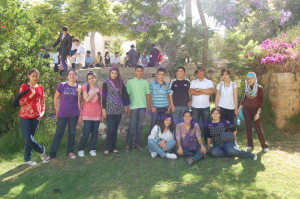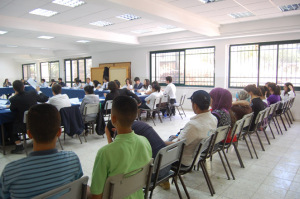Intern journal: When the students become teachers...
Teaching is a humbling experience, but humility need not mean feeling defeat – rather, it is awareness that my role as a teacher and even my lesson plans provide only the foundation for all the growth and excitement that can take place in a classroom. Indeed, the moments I most treasure from working with my kids this summer are the ones in which my role as a teacher is minimal – the moments in which I feel a surge of pride to see them reach out to help, teach, and support each other. In my Explorers class, we were presenting the photos that each “Explorer” had taken with his or her take-home camera: introducing family members, explaining neighborhood hangouts, and displaying the beauty in their surroundings that they had wanted to capture on film – a view of Nablus in the evening from the top of a Khallet al-Amood hill, a close-up of a display of car engines waiting to be sold, flowers and plants from around their homes. As Halima, from Askar camp, shakes her head repeatedly when it is her turn to go up and show her photos, Ibrahim, from Balata camp, sees that she is nervous and offers to stand with her as she speaks to the class. Drawing confidence from his presence, Halima walks up to the front of the room and allows the class to get to know her better, through her eyes, through her words. A striking example of the power of peer-to-peer inspiration and support has occurred twice with my Model United Nations class. On many levels, it is impossible to solely convey through words the organized chaos that is a group of high school students getting dressed up and debating, writing, and voting to address the challenges faced by the countries they represent and the world at large. Early in the summer program, therefore, the class went on a trip to Ramallah to watch the Model UN club at the Friends School go through a four-hour simulation of what MUN geeks affectionately refer to as “ECOSOC,” the Economic and Social Council of the UN. The students were enraptured to see Palestinian students their age, who have had far greater educational opportunities and thus can debate the merits of immigration policies like pros, engage in the simulation and fully enjoying themselves while doing it. “How can we be like them?” they asked me, and I told them we had plenty of time to practice in class! I’ve built up a relationship with the students from Ramallah, after having advised them on the planning of a “Model UN summer camp” for students new to the club (and I was even invited to be the keynote speaker at the opening ceremonies of the camp!) A week ago, three of these students were kind enough to visit and give a guest lesson to TYO’s Model UN students on the UN, Model UN, and how to learn to represent your assigned country with confidence and intelligence.
The effect of this lesson on my TYO students was tangible. Brimming with excitement after the lesson, they repeated the same desire: “We want to be like them!” and recommended we increase the amount of times per week that the class meets. To have high school students, in many ways just like themselves, tell of their experiences as Model UN delegates to conferences around the Middle East, meeting and befriending students from around the world, galvanized my students to spend their summer training to be mini-diplomats in a way I could never do on my own, no matter how stimulating a lecture I give or how creative a “world affairs” game I concoct.
For these reasons and beyond, interning at TYO is to be so much more than a teacher. To have my students – at TYO and from Ramallah – build on each other’s strengths, learn from each other’s experiences, and inspire each other to attain what they wouldn’t have previously conceived to be possible is something I am thrilled to enable. 


